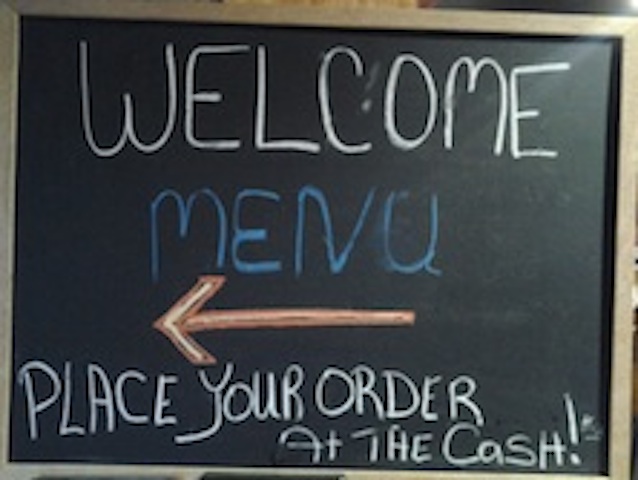Quick links
cash
< Canadian French caisse
DCHP-2 (Sep 2012)
n. — especially Montreal, Eastern Ontario
a place in a store where purchases are paid for.
Type: 3. Semantic Change — Cash 'cash register' was first noted in Gage-3 (from 1983). It is the preferred term among Anglophone Montrealers, reported by 77%, as compared to 13% reporting cashier. In English-speaking Quebec, 60% report cash (Boberg 2010: 171-72). The high use in French Canada is a result of the phonetic similarity with the French equivalent caisse. Cash is also the most frequent term in eastern Ontario (34%), where it is only slightly more popular than cashier (28% ).
Although English speakers in Montreal are generally considered as relatively isolated within mainland Canadian English (see, e.g., Boberg 2005: 36), one can see that the border regions also use the Montreal-dominant form cash. The term also appears outside of the area (see Image 1 from Vancouver), though at lower rates. On the whole, the rest of Canada favours cashier (for regions west of Quebec) or check-out (for regions east of Quebec) (Boberg 2010: 178). Cash for 'cash register' is likely a lexical transfer from Canadian French into Canadian English in Quebec, which is in non-French areas reinforced as a shortening of cash register to cash.
Alternatively, a semantic change of cash from 'physical banknotes and coins' to 'till' - the place where the banknotes and coins are stored - is another explanation, though a less likely one.
See also Gage-3, s.v. "cash" (3), which is marked "Informal".
Although English speakers in Montreal are generally considered as relatively isolated within mainland Canadian English (see, e.g., Boberg 2005: 36), one can see that the border regions also use the Montreal-dominant form cash. The term also appears outside of the area (see Image 1 from Vancouver), though at lower rates. On the whole, the rest of Canada favours cashier (for regions west of Quebec) or check-out (for regions east of Quebec) (Boberg 2010: 178). Cash for 'cash register' is likely a lexical transfer from Canadian French into Canadian English in Quebec, which is in non-French areas reinforced as a shortening of cash register to cash.
Alternatively, a semantic change of cash from 'physical banknotes and coins' to 'till' - the place where the banknotes and coins are stored - is another explanation, though a less likely one.
See also Gage-3, s.v. "cash" (3), which is marked "Informal".
It is likely that this national minority term is currently (in 2016) spreading, due to the conciseness of the term (e.g. principle of economy in linguistics).
Quotations
1956
"We hadn't planned on selling Sunday, but we just couldn't turn away all those people. We didn't even have to wait on them. They chose their flowers and walked to the cash."
1980
Extended hours would mean added jobs, more shopper convenience, especially for shift workers, fewer frustrating lineups at the cash, less strain on overworked and over-rushed cashiers and perhaps a larger turnover for the store.
1989
We are told that in the name of simplicity, visibility and fairness -- the current system discriminates in favor of imports -- the manufacturers' sales tax must be replaced with a national sales tax that will be visible every time we go to the cash.
1993
A few customers go to the cash, buying bread and lottery tickets. There is lighthearted discussion about that night's jackpot.
1994
"Our customers prefer to go to the cash and find no surprises, [sic] says LCBO spokesman Chris Layton.
1996
The first crook stood in front of the cashier and said, "I have a gun, go to the cash and get the money.''
2001
He'd go to the cash with a card and a smile, saying it was his granddaughter's birthday the next day.
References
- Boberg (2005)
- Boberg (2010)
- Gage-3
Images
